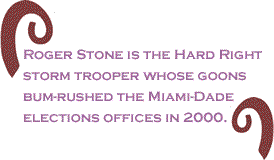
|
|||||||||||||||||||||
|
Rev. Al Sharpton’s race for the Democratic presidential nomination should be considered a resounding success – for just about everyone except the candidate himself. By sheer dint of will and force of personality, Sharpton imposed a vibrant Black presence on the party’s primary process. (Had Sharpton not run, Carol Moseley-Braun would not have been drawn into the race – ironically, as a counterweight to Sharpton.) “Big Al” was truly large on the stage, a daunting deterrent to the intrusion of the usual coded racial rhetoric into the Democratic debates or on the stump: Don’t even think about it, said Al, without having to move his lips. Sharpton gave voice – at times, brilliantly – to the core progressive principles of the Black political consensus, causing big-footed white men to step lightly and in the right general direction.
Sharpton’s candidacy has had a magical effect on the racial chemistry of the Democratic dialogue, in starkest contrast to the White Citizens Council-type language of the GOP. He caused the white candidates to repeatedly demonstrate, through their words and campaign schedules, that they valued Black voters. In
that sense, Sharpton’s
very success detracted from his appeal. Unlike whites, who are the ultimate bloc voters, African Americans have always responded across racial lines to direct, respectful appeals for their votes. Sharpton worked a civilizing mojo on the white contenders this season. (Even Democratic Leadership Council favorite Sen. Joseph Lieberman – now, thankfully, gone from the race – dropped his references to the red herring, “quotas.”) Call it nine months of behavior modification therapy, courtesy of Rev. Al. Thanks to Sharpton, others in the Democratic field struggled to make themselves worthy of Black votes. They were rewarded and are, presumably, grateful. The debacle
Sharpton may or may not appreciate the effect he has had on the behavior and marketability of his white opponents. However, he has much more to worry about than whether he gets to speak at the Democratic convention, in Boston. The growing storm over his covert alliance with rightwing Republicans probably came too late to have any measurable impact on Tuesday’s elections, but the revelations are a deathblow to his actual goal: to become the recognized leader of African Americans. Although the story has been framed in terms of treachery to the Democratic Party, or as evidence of Sharpton’s visceral disdain for white “liberals,” the tale will resonate somewhat differently among African Americans. Sharpton comes across as a hapless stooge of the worst elements of the GOP. Roger Stone, a millionaire political consultant who began his career as a 19-year-old Watergate dirty trickster, virtually took over the Sharpton campaign in the last quarter of 2003, according to reports in the New York Times (January 25), Salon.com (”A GOP Trickster Rents Sharpton,” February 3) and New York’s Village Voice (“Sleeping with the GOP,” February 3). Stone and Sharpton were introduced two years ago by Donald Trump, the celebrity millionaire, said the Times. Stone brought in Charles Halloran to replace Sharpton campaign manager Frank Watkins, a longtime advisor to the Jesse Jacksons, Junior and Senior, who resigned in late September. (In the Village Voice article, Sharpton says Watkins was fired.) Halloran previously managed the New York gubernatorial campaign of far-right billionaire Tom Golisano, on the Independence Party line. He also managed a mostly white, conservative party’s attempt to unseat the first Black-led government of Bermuda. Stone provides “ideas and direction, while Mr. Halloran…does the front-line work,” said the Times. “In the attacks on Dr. Dean, Mr. Stone helped set the tone and direction while Mr. Halloran did the research. Mr. Halloran came up with Dr. Dean's hiring record as governor, for example, aides to Mr. Sharpton said.” Another rightwing purported Sharpton crony, Tucker Carlson of CNN’s “Crossfire,” said Stone and Sharpton are both motivated by a “disdain for white liberals.” Joe Conason, of Salon.com, contends that Sharpton is a menace to the Democratic Party. “Stone certainly serves the Republican party by sustaining and promoting Sharpton,” wrote Conason. “The Democratic Party, whose institutions and candidates [Sharpton] has consistently undermined for many years, is merely a convenient vehicle for his advancement.” Blinded by the Right
As the primary votes were being counted on Tuesday night, crack investigative reporter Wayne Barrett’s bomb exploded in the Village Voice, a devastating document-of-no-return for Al Sharpton. Barrett and his team describe what amounts to a lock, stock and barrel takeover of the Sharpton apparatus by Stone and the “half-dozen incongruous top aides who've worked for him in prior campaigns.” The Republican consultant also appears to have absorbed Sharpton’s Harlem-based National Action Network (NAN). “The combination of the unpaid or underpaid services of Stone, Halloran, [and Stone operatives] Baynard, Archer, et al., together with the NAN subsidies, paint a picture of a Sharpton operation that is utterly dependent on his new ally Stone, whose own sponsors are as unclear as ever,” said the Voice. Possibly most disturbing of all is Stone’s role in securing federal matching funds for the campaign. To qualify for matching dollars, candidates must first raise $100,000 – $5,000 from each of 20 states. Each individual contribution must be of no more than $250. The combined resources of the Sharpton campaign and NAN (“A shell,” according to an aide imported by Stone) either could not or would not assemble the necessary 400-plus contributors grouped by state, to meet the federal threshold. Stone stepped in, filling the gaps with small checks from relatives, lobbyist friends and assorted denizens of the Right. Did Sharpton really need a Republican organization to do that? Was a household name incapable of finding 20 people in 20 states with $250? Or does he instinctively opt for the quick fix or favor?
Stone has “loaned” Sharpton at least $270,000, and the candidate has made frequent use of Stone’s credit card, according to the Voice story. NAN funds have been hopelessly commingled with campaign monies – a potential legal disaster. The relationship boggles the mind. Roger Stone is the Hard Right storm trooper whose goons bum-rushed the Miami-Dade elections offices in 2000, shutting down the recount and setting the stage for George Bush’s “selection.” Sharpton claims he and Stone are just friends. But reporter Wayne Barrett is a veteran dirt-digger who has taken down a number of New York’s Sleaziest. Sharpton and Stone seem to have made Barrett’s job easy – indeed, Stone doesn’t appear anxious to hide the fact that he has captured a Negro. Sorely tested, he failed
Barrett’s article sketches Rev. Al’s wheeling and dealing in the Byzantine world of New York politics, arrangements in which, as often as not, he has actively or tacitly backed Republicans. So have lots of New York Democrats; the city is a shadowy, immensely corrupt environment – a gray political landscape. Sharpton has long been known as an influence trader. This time, he got eaten – whole. We at In our April 24 issue, “What the Black Presidential Candidate Must Do,” we declared, wishfully: “We believe that Al Sharpton is up to the task, if he maintains a clear vision and personal discipline.” Believing in the possibilities of human growth, if not redemption, and in the transformative powers of righteous political movements, we wrote: “Sharpton will show who he is in the course of the race. Even those of us who think we know him cannot predict what the National Action Network leader will become as he is tested by the experience.” Now we know.
The Sharpton campaign’s descent into what looked like madness became apparent shortly after the resignations of Jesse Jackson family confidant Frank Watkins and South Carolina coordinator Kevin Gray, September 30. We don’t know what precipitated their exits, but Roger Stone and his Republicans moved right in. In late October, when it became clear that Chicago Congressman Jesse Jackson Jr. would endorse Howard Dean, Sharpton went on the attack, shedding the steady, even statesmanlike persona he had cultivated in the previous months of campaigning. We described the spectacle in the November 13 Cover Story, “Al Sharpton’s Political-Emotional Breakdown”:
Bush’s mega-crimes, Al’s misdemeanors Every story such as this one, in which small men on transient stages act out petty passions, must be framed by a larger perspective. The overarching corruption in America is centered in the White House, where a racist cabal of pirates and thieves prepares to swamp the coming election in fantastic, unprecedented waves of money. At this writing, George Bush has $91 million dollars in the bank. According to Charles Lewis, author of “The Buying of the President,” Bush’s presidential campaign account swells at the rate of $600,000 per day. In puny contrast, Al Sharpton finds himself – through his own moral and character flaws – the poor captive of Roger Stone, a rich, cynical, misanthrope who pummels democracy for sport. It is a great irony that the electoral process that Sharpton did so much to enrich, in which his formidable presence deterred white Democrats from reverting to racist type, has resulted in more palatable choices for Black voters, but negligible delegate clout for himself.
We must ask why Al Sharpton emerged as a contender for national Black leadership via the presidential primaries. The answer is simple, and should be deeply troubling: He was the only one to step forward. Such was also the case in the decades of Sharpton’s rise to prominence in New York. When police brutalized African Americans, Al Sharpton was there. When demonstrations needed to be mounted, Sharpton was on point. When Black anger rose, Sharpton rose to the occasion – year, after year, after year. Whites of all political persuasions denounced Sharpton as an opportunist and publicity seeker – as if they were telling Black folks something we didn’t know. But we desperately needed publicity, and an opportunity to be heard. Rev. Al seized the spotlight and shook things up, which was a lot better than nothing. Somebody Black had to do it. So, who’s stepping forward, now? |
February
5,
2004 |
|||||||||
|
|||||||||
|
|
|||||||||
| Printer Friendly Version | |||||||||
 |
|||||||||
| |
|||||||||
| |
|||||||||
































